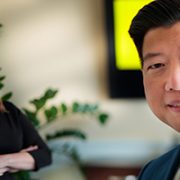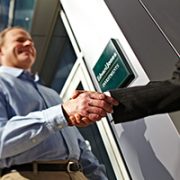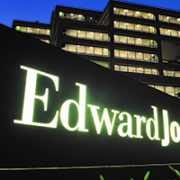Experienced Financial Advisor:
Right Now is an Ideal Time for Legacy Planning
by Ken Cella
Share this post:

For many, the holidays are a time spent with family, when everyone gathers around the table for great food and warm company. For financial advisors, this year’s holiday season should mean something else as well: talking to clients about the legacy they hope to leave.
That’s because a recent study from Edward Jones, in partnership with Age Wave and The Harris Poll, found that for many Americans, the pandemic triggered conversations with close family members about their end-of-life plans and preferences. In fact, the survey found that a third of U.S. adults had such conversations since the start of the pandemic, and for 44.5 million Americans, it was the first time they had talked to family members about topics like finances, health and legal plans. What’s more, two-thirds of Americans said the pandemic has caused them to think more about the kind of legacy they want to leave to their families.
“At Edward Jones, we consider counseling clients about leaving a lasting impact to be a fulfillment of our purpose: to partner for positive impact to improve the lives of our clients and colleagues, and together, better our communities and society. ”
-Ken Cella, Principal, Client Strategies Group
At the same time, while the pandemic has driven many people to have conversations about legacy planning, there’s a gap between Americans’ intentions and actions on the subject. For example, more than 70 percent of Americans 50 and over believe a will is the most important document to have in place before someone dies, but only 49 percent of this group actually has one. And only 19 percent have completed all three essential end-of-life documents – a will, health care directive or living will, and designated power of attorney.
With legacy planning top-of-mind for many Americans, combined with this intention-action gap, now is a time when financial advisors can be of great help to their clients. And while the holidays may seem like an unusual time to think about legacy planning, there are decisions to be made that typically require conversations with family members. Considering many families celebrated the holidays virtually last year, this may be the first time some families are gathering in two years.
Obviously, discussions around legacy planning, while very important to have, can make many people uncomfortable. In fact, our research found that three in five U.S. adults say there are barriers to overcome when they attempt to have family discussions around important financial topics like this. The most common of these roadblocks are wanting to avoid family conflicts (22%) and burdening family members with their finances (20%) and being too uncomfortable to discuss these topics (18%). While legacy planning may not be an ideal topic of conversation at the holiday dinner table, family gatherings can offer a rare opportunity for family members to discuss it in person. (We recommend waiting until after dessert.)
With all this in mind, it’s a good time for financial advisors to proactively check in with their clients and learn which of them may be looking for help with these discussions in the weeks ahead. Offer guidance to clients around the best ways to engage family members in these sensitive conversations; it may help to offer to host them in your office, so you can act as a facilitator and resource for all involved.
Legacy planning documents are too important to be overlooked, and your clients can enjoy a tremendous peace of mind once they have them completed with an estate-planning attorney. At Edward Jones, we consider counseling clients about leaving a lasting impact to be a fulfillment of our purpose: to partner for positive impact to improve the lives of our clients and colleagues, and together, better our communities and society. The circumstances are right for engaging clients in a conversation about it, and it’s an opportunity to show clients your value as a financial advisor. Be sure not to let it pass by.
Related Posts

Edward Jones: Where Main Street and Amazon Meet

Edward Jones Named one of the Best Workplaces in Financial Services & Insurance

Serving Clients More Completely Starts with Flexibility, Autonomy and Choice for Branch Teams

For retirees, having a purpose is as essential as financial security and good health for living well in retirement. According to our own research, in partnership with Age Wave and The Harris Poll, 40% of retirees said that being generous and giving back to their community is their greatest source of purpose, meaning and fulfillment in retirement. That’s why charitable giving should be part of the holistic financial conversation.
“As we enter the fall giving season, we have a great opportunity to partner with our clients to determine the appropriate giving strategies for them.”
-Ken Cella, Principal, Client Strategies Group
Charitable Giving and Complete Wealth Management
Depending upon the individual investor’s goals and tax situation, there are a variety of charitable giving strategies to consider.
- For example, in 2021 only, those taking a standard tax deduction can deduct up to $300 ($600 for joint filers) in cash contributions to an IRS approved charity. If investors are looking to make a more sizable contribution, donating appreciated securities directly to qualified charities can be win-win. The charity has the potential to receive an even larger gift if the donated securities continue to appreciate, and the investor can take both a tax deduction and avoid paying capital gains taxes on the donated securities.
- Investors over age 70½ may also have the option of giving up to $100,000 directly from their retirement account to a qualified charity. This strategy allows the investor to avoid paying taxes on the portion of their required mandatory distribution (RMD) that is transferred to the charity.
The Edward Jones Charitable Gift Fund
Contributing to a donor-advised fund (DAF), such as the Edward Jones Charitable Gift Fund, is another way to give back. DAFs are a charitable-giving tool that allows our clients to make irrevocable contributions to the Fund—usually of appreciated securities–and receive an immediate tax deduction. As the fund grows, clients can request distribution in the form of grants to IRS-approved charities of their choice.
DAFs offer a variety of advantages depending upon the client’s portfolio, preferred charities and desired giving practices. For example, DAFs allow clients to grow their charitable gifts over time, tax free, evaluate their favorite charity’s fiscal responsibility over time, and remain anonymous if they desire. DAFs can also streamline tax reporting and reduce tax liabilities on appreciated investments.
A DAF isn’t right for every investor or every charitable contribution, however. Grants generally cannot be used for specific fundraising events because there is a delay between the time the grant is requested and when it is given to a charity. DAFs may also have account minimums for contributions and grants, they assess a fee for ongoing administration, and cannot receive contributions directly from retirement accounts.
Navigating all the charitable giving options can be challenging. As we enter the fall giving season, we have a great opportunity to partner with our clients to determine the appropriate giving strategies for them. The timing couldn’t be better to have those important charitable giving conversations that can be so rewarding in helping our clients find and live their purpose.
Related Posts

Edward Jones: Where Main Street and Amazon Meet

Edward Jones Named one of the Best Workplaces in Financial Services & Insurance

Serving Clients More Completely Starts with Flexibility, Autonomy and Choice for Branch Teams
Experienced Financial Advisor:
The Client Attraction Marketing Hub – A Resource for Our Financial Advisors
Share this post:
At Edward Jones, we realize the importance of having accessible, turnkey tools to help grow client relationships. The Client Attraction Marketing Hub is a new, easy-to-use portal for our financial advisor marketing needs. It’s one more way we support our financial advisors with the tools and functionality needed to grow successful and sustainable businesses.
After viewing this two-minute video, consider learning more about the Edward Jones Opportunity by emailing us at JoinEJ@edwardjones.com. A representative from Branch Development will respond promptly.
Related Posts

Edward Jones: Where Main Street and Amazon Meet

Edward Jones Named one of the Best Workplaces in Financial Services & Insurance

Serving Clients More Completely Starts with Flexibility, Autonomy and Choice for Branch Teams

Edward Jones Financial Advisors Rate Firm Highest in Overall Employee Advisor Satisfaction, According to J.D. Power
Experienced Financial Advisor:
Technology Strengthens Client Relationships, Attracts New Investors
by Ken Cella
Share this post:

Make no mistake. We as financial advisors build our reputation on deep, trusted relationships with our clients.
These relationships set us apart and enable us to offer tailored solutions that help our clients reach their financial goals. It is in our DNA and our commitment to human-centered relationships won’t change.
However, a recent survey we conducted with Morning Consult on the digital client experience showed that 95 percent of investors polled said they feel it’s important that their financial advisors use the latest technology and tools when advising them.
“Having an integrated system to process and share insights and predictions will take our industry to the next level in understanding what is important to our clients.”
-Ken Cella, Principal, Client Strategies Group
While 83 percent of survey respondents said they would prefer working with a human financial advisor rather than a robo-advisor, they also told us they wanted digital tools and technology that help them understand if they are okay financially, how they got to where they are and where they are headed.
Technology as an Enabler
Investing in powerful digital technologies is enabling Edward Jones to strengthen relationships with our more than 7 million clients and to connect with the 42 million investors we are looking to serve. As we move through our digital transformation, the personalized client experience remains our priority. For example, earlier this year we redesigned edwardjones.com with a modern new design and released a new app for clients. These digital tools allow prospective clients to learn about Edward Jones on their terms, and clients to track their goals and stay connected to their financial advisor through new communication channels.
Changing the Way We Work
Every year, millions of investors visit financial firms’ digital platforms because they are seeking a financial advisor relationship. In a recent survey among visitors and investors on www.edwardjones.com,19 percent say that relatability is important to them and 31 percent say that understanding the financial advisor’s approach to advice and investment strategy matters most. It’s clear investors also want to know more about the financial advisor’s areas of focus (21%) and level of experience (28%).
Recognizing the important role technology can play in building and fostering new client relationships, we developed a custom, web-based application called Edward Jones Match which was built to harness information that supports investors in their journey to connect with a financial advisor. Using a short digital quiz that takes a few minutes to complete, investors are instantly matched with financial advisors who have the profile, credentials and approach that matter most to them. This is the kind of personalized client experience technology can deliver. It’s just one example of what’s possible.
Having an integrated system to process and share insights and predictions will take our industry to the next level in understanding what is important to our clients. It will also enable us to better understand the needs of potential clients and help them identify the ideal financial advisor for them. I can’t think of a more powerful first impression that a prospective client could experience.
While having the technology capabilities is critical, it means nothing if we don’t change how we work and think. A digital transformation is as much about mindset and the way we work as it is about the technology itself. The way we approach prospecting and taking care of our existing clients must shift. In-person meetings, speaking engagements and other traditional prospecting strategies are now augmented with digital strategies that include platforms like LinkedIn Sales Navigator, among other off-the-shelf or proprietary offerings. It also means being available to existing clients through digital channels like text and chat and providing greater transparency and data access, empowering them and giving them more control of their financial future.
Our clients want a financial advisor who understands them and can help guide them to achieve their financial goals. That’s not changing. But the expectations our clients and prospective clients have for technology are continually evolving and we must evolve with them.
Related Posts

Edward Jones: Where Main Street and Amazon Meet

Edward Jones Named one of the Best Workplaces in Financial Services & Insurance

Serving Clients More Completely Starts with Flexibility, Autonomy and Choice for Branch Teams

Edward Jones Financial Advisors Rate Firm Highest in Overall Employee Advisor Satisfaction, According to J.D. Power
Experienced Financial Advisor:
The Power of Partnership at Edward Jones
Share this post:
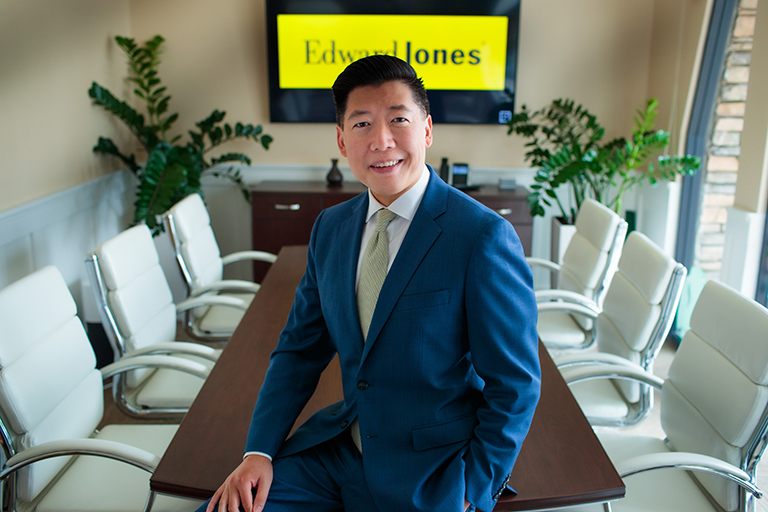
Back in 2003, Financial Advisor David Tam was drawn to St. Louis–based investment firm Edward Jones because of its unique branch team business model, a structure consisting of a financial advisor and a branch office administrator working in tandem. Senior branch office administrator Sarah Karpicus joined his office in San Diego about a year later, and the two have worked together ever since.
“I figured if the firm was willing to invest in rookies, It would probably treat its veterans pretty well. Two decades later, I haven’t looked back.”
-David Tam, Financial Advisor
This personalized approach to investing allows the branch team to build trusted relationships with their clients, while delivering superior value. It’s a model that doesn’t exist at other financial institutions—and it’s not only clients who benefit from it.
“Being a part of a branch team was unique for me as a new financial advisor just starting out,” Tam says. “But I figured if the firm was willing to invest in rookies, it would probably treat its veterans pretty well. Two decades later, I haven’t looked back.”
Today, Tam and Karpicus’s branch ranks in the top 3% of the firm. As the branch has evolved, Karpicus says her role has evolved too. She handles everything from supporting business strategy and operations to facilitating hospitality and event planning. Karpicus has also benefited from another aspect of this one-of-a kind model: becoming a limited partner at Edward Jones by purchasing a small equity share in the firm.
“I get to be a partner in the work and success of the firm,” she says. “It creates a spirit of community.”

Collaboration is a hallmark of the firm’s culture, and both Tam and Karpicus believe their long-term, team-based approach has allowed them to better serve clients and build deep, lasting relationships over time. Typically, Tam works on clients’ big-picture financial goals, while Karpicus helps with carrying out the administrative aspects of their strategies, such as transferring an account or dealing with estate issues.
Often that requires calling other financial institutions on their clients’ behalf. Karpicus has seen first-hand how impersonal that type of interaction can be, which has made her appreciate the high-touch service that the Edward Jones model offers.
“Clients know that if they call our branch, they’re going to get one of us. They know our names; they know what we did over the summer,” she says. “We are real people to them, and we have a personal relationship.”
That human touch and the deep trust it engenders allows Edward Jones financial advisors to not only help clients reach their financial goals but also to become a meaningful part of their lives and communities. From meeting new babies to attending weddings, Tam has witnessed many of his clients’ major life milestones.
“I’m fortunate to create long-term relationships with our clients,” Karpicus says. “It feels like an extended family.”
Related Posts

Edward Jones: Where Main Street and Amazon Meet

Edward Jones Named one of the Best Workplaces in Financial Services & Insurance

Serving Clients More Completely Starts with Flexibility, Autonomy and Choice for Branch Teams

Edward Jones Financial Advisors Rate Firm Highest in Overall Employee Advisor Satisfaction, According to J.D. Power
Experienced Financial Advisor:
Firm Culture – How Important Is it to Your Success?
Share this post:

Moving firms is a highly personal decision for financial advisors. Each person places different emphasis on a variety of factors. In a recent firm culture study conducted by AdvisorHub in partnership with Edward Jones, common cultural factors emerged as a top reason for making a move. “When I transitioned to Edward Jones, it was an opportunity to build my business, while getting the support I needed to succeed. I have the independence I was looking for, but I never feel alone.” -Jessica Barron, Financial Advisor The study showed other top reasons for joining a firm include the technology, a desire for independence, work-life flexibility, and supportive management.
Related Posts

Edward Jones: Where Main Street and Amazon Meet

Edward Jones Recognized for Exceptional Training Program
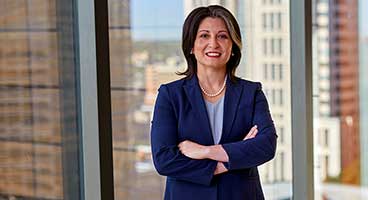 https://edwardjones-stage.xcc.smashfly.io/wp-content/uploads/sites/2815/2022/02/blog-sonia-featured.jpg
200
368
ndowney
https://cdn-static.findly.com/wp-content/uploads/sites/936/2020/09/Careers-logo_9-15-NEW-SVG.svg
ndowney2022-02-14 19:14:332022-02-14 20:09:34Make Your Version of Your Own Dream
https://edwardjones-stage.xcc.smashfly.io/wp-content/uploads/sites/2815/2022/02/blog-sonia-featured.jpg
200
368
ndowney
https://cdn-static.findly.com/wp-content/uploads/sites/936/2020/09/Careers-logo_9-15-NEW-SVG.svg
ndowney2022-02-14 19:14:332022-02-14 20:09:34Make Your Version of Your Own Dream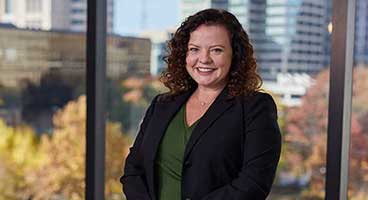 https://edwardjones-stage.xcc.smashfly.io/wp-content/uploads/sites/2815/2022/02/blog-helen-featured-1.jpg
200
368
ndowney
https://cdn-static.findly.com/wp-content/uploads/sites/936/2020/09/Careers-logo_9-15-NEW-SVG.svg
ndowney2022-02-14 18:55:082022-02-14 19:10:39It's Not About Balance. It's About Work-life Integration.
https://edwardjones-stage.xcc.smashfly.io/wp-content/uploads/sites/2815/2022/02/blog-helen-featured-1.jpg
200
368
ndowney
https://cdn-static.findly.com/wp-content/uploads/sites/936/2020/09/Careers-logo_9-15-NEW-SVG.svg
ndowney2022-02-14 18:55:082022-02-14 19:10:39It's Not About Balance. It's About Work-life Integration.Experienced Financial Advisor:
Clients Want to Connect Purpose and Investing – and We Can Help Them
by Ken Cella
Share this post:

Having a strong sense of purpose is important for any organization, particularly for those of us in financial services. At Edward Jones, for example, everything we do is fueled by our purpose to improve the lives of our clients and colleagues, and together, better our communities and society.
While our company purpose is paramount to us, the focus of our purpose is outside the four walls of our organization. We’re intentionally attuned to partnering with our clients to help them discover their sense of purpose, and for two good reasons. First, it enables us to provide services that give clients an opportunity to bring their purpose to life in ways that are important to them. Second, clients are increasingly interested in working only with companies that align with their core values.
While our company purpose is paramount to us, the focus of our purpose is outside the four walls of our organization. We’re intentionally attuned to partnering with our clients to help them discover their sense of purpose, and for two good reasons.
One way in which we’re doing this is in the area of sustainable investing – offering our clients ways to consider environmental, social and governance (ESG) criteria in their portfolios. Many studies show that a growing number of individual investors want to make a positive impact with their money. In fact, 33% of total assets under professional management in the United States – that’s one out of every three dollars – is already being invested using some type of sustainable strategy, according to a 2020 report from U.S. SIF: The Forum for Sustainable and Responsible Investment. Additionally, insights and industry studies tell us that demand is increasing, especially among certain kinds of clients.
We believe sustainable investments can help our clients achieve their financial goals as part of a diversified portfolio, and we are working to make more sustainable investments available to them while also helping them understand all the options available and any associated risks.
We’re also offering our clients opportunities to support causes that are important to them and do it in a way that helps their contributions go even further. We do it through a donor-advised fund, or DAF, that we call the Edward Jones Charitable Gift Fund. Through the Charitable Gift Fund, clients make an irrevocable contribution for which they receive an immediate tax deduction. Over time, they can then direct grant requests to IRS-approved public charities.
The money in the fund is invested based on the client’s preferences, giving it the potential to grow tax-free, thus expanding their charitable impact. It’s a great option for clients who want their charitable giving to be tax-deductible, but don’t give enough each year to itemize their deductions. It’s also helpful for clients who own investments that have significantly increased in value, or for those who have experienced an unusually high-income year, as the Charitable Gift Fund can help alleviate tax burdens while the charities receive more proceeds than if the client gifted post-tax income. Edward Jones, its employees and financial advisors cannot provide tax or legal advice. Investors should consult their attorney or qualified tax advisor regarding their situation.
Both sustainable investing and the Charitable Gift Fund make sense because they not only give our clients opportunities to use their money in a way that is aligned with their personal purpose, but they also can help clients make progress toward their financial goals.
These are examples of the kind of service that clients throughout the industry are increasingly coming to expect. They aren’t looking for just financial advice; in many cases, what they seek is more like guidance around holistic financial wellness. If you or your firm aren’t already offering these kinds of services – or planning to – the time to start is now.
Related Posts

Edward Jones: Where Main Street and Amazon Meet

Edward Jones Named one of the Best Workplaces in Financial Services & Insurance

Serving Clients More Completely Starts with Flexibility, Autonomy and Choice for Branch Teams
Awards & Accolades
Highest in Employee Advisor Satisfaction Among Financial Investment Firms
Share this post:
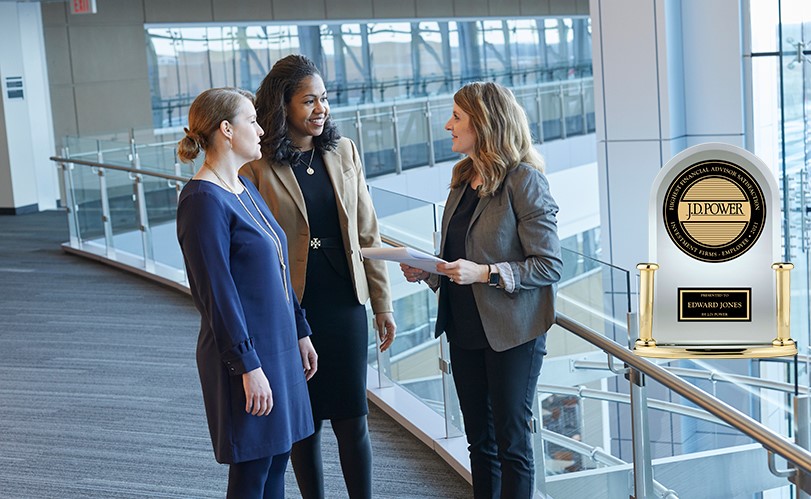
For the 12th time, Edward Jones Ranks “Highest in Employee Advisor Satisfaction Among Financial Investment Firms” by J.D. Power.
Based on responses from Edward Jones financial advisors, the firm earned an overall score of 890 points out of 1,000. This compared to the average score of 743 among the eight employee-channel firms measured by the J.D. Power 2021 U.S. Financial Advisor Satisfaction Study.
“This is a tremendous honor because it embodies our purpose of partnering to make a positive impact in the lives of our clients and colleagues, and together, benefit our communities and society,” says Kristin Johnson, Chief Human Resources Officer and Chief Transformation Officer for Edward Jones. “It’s been a challenging year for many investors, and our financial advisors, branch office administrators and home office associates have really come together as one Edward Jones team to serve our clients’ needs in a comprehensive way. This has included going beyond finances to focus on the well-being of our clients and their families, their health and yes, connecting with their purpose.”
This is a tremendous honor because it embodies our purpose of partnering to make a positive impact in the lives of our clients and colleagues, and together, benefit our communities and society.
-Kristin Johnson, Edward Jones Chief Human Resources Officer
Between January and April 2021, financial advisors were asked to rate their firms in terms of leadership and culture, products and marketing, professional development, operational support, technology, and compensation. Edward Jones ranked No. 1 in products and marketing, compensation and professional development.
“We are a place of belonging at Edward Jones – a welcoming and productive environment where people feel comfortable to bring their full selves to work and all can achieve their full potential – inclusive of their different backgrounds and experiences,” Johnson added. “That feeling of belonging translates into supportive behaviors such as willingness to recommend. It also is what enables our firm to grow its impact and add value to our clients, colleagues and communities.”
Edward Jones received the highest score among employee advisors in 12 J.D. Power advisor satisfaction studies, which were completed in 2007, 2008, 2010, 2012-2015, 2017-2021. The J.D. Power U.S. Financial Advisor Satisfaction Studies of employee advisors’ satisfaction is distributed among those who are employed by an investment services firm. Visit jdpower.com/awards for more details.
“The consistent success of Edward Jones in this study since it was first launched back in 2007 is a great testament to their organization’s commitment to delivering a superior experience to the advisor,” said Michael Foy, Senior Director and Head of Wealth Intelligence at J.D. Power.
Related Posts

Edward Jones Named on the Top 100 Companies to Watch for Fully Remote Jobs in 2023 List

Edward Jones Named One of the World’s Most Admired Companies by FORTUNE Magazine

Edward Jones Recognized for Exceptional Training Program

Edward Jones Named to the 2022 Best Workplaces for Women List by Great Place to Work® and Fortune® Magazine
Experienced Financial Advisor:
Five Leadership Lessons Learned During the COVID-19 Pandemic
by Ken Cella
Share this post:
While the COVID-19 pandemic certainly isn’t over, it does feel as though we’ve come far enough through it to gain some perspective on what we’ve learned during this unusual and challenging period. Even when we reach the point where we can put our face masks in a drawer for good, some lessons that have emerged certainly will continue to be relevant for many years to come.
1. Have a Clear Why
One lesson is having a clear why and the importance of being very clear about why you do the work you do, and why it’s needed in the world. The pandemic truly clarified the importance of being certain about your why – your purpose. After all, that strong sense of purpose helped us all push through and learn new ways to communicate when we couldn’t see clients and colleagues face-to-face, and it’s what kept us going on long days during the pandemic when so many aspects of our work seemed so unsettled.
2. Develop a Set of Guiding Principles for Decision-Making
We all remember the early days of the COVID outbreak, when every business was in crisis mode and trying to make decisions about how to adjust. At Edward Jones, when we realized our leadership team needed to make a series of critical decisions, our first step was to establish our guiding principles for times of uncertainty.
Doing so made it clear what was most important to us – taking care of our clients, valuing the contributions of each of our colleagues, and so on. These principles became a litmus test for all our decisions and allowed us to move quickly. Every financial advisor’s practice, no matter the size, can benefit from this kind of clarity in a crisis.
3. Be Comfortable Leading Without a Playbook
During a crisis, you will rarely have the luxury of time. And in some cases, the information you have at hand will be incomplete, or will conflict with other information you received from other sources. Your clients and your team won’t be able to wait. During times like this, you need to be comfortable with being uncomfortable.
Making decisions in these conditions can be unsettling, but if you have your guiding principles in place, they will guide you – and the people around you – to help you get it right.
4. Communicate With Knowledge and Empathy
As you likely heard when talking to clients and colleagues in recent months, the pandemic caused many people to feel anxious or even frightened. As a financial advisor and a leader, you have to keep in mind the emotions your stakeholders may be feeling, and adjust your interactions with them accordingly. Be patient. Listen more closely to what people are telling you. That empathy will go a long way with your clients and with your colleagues.
5. Be Purpose-Driven in Everything You Do
Finally, and most importantly, be purpose-driven in everything you do. Work with like-minded people who share your sense of purpose and are fully in it with you. When you’re fully purpose-driven, you’re better equipped to deal with rapidly changing circumstances, because you have a clear focus. That purpose serves as your north star, guiding all of your actions, allowing you to be decisive and effective.
Related Posts

Edward Jones: Where Main Street and Amazon Meet

Edward Jones Named one of the Best Workplaces in Financial Services & Insurance

Serving Clients More Completely Starts with Flexibility, Autonomy and Choice for Branch Teams
Experienced Financial Advisor:
An Alternative to Going Independent
Share this post:

As technology and client service methods evolve, the financial services industry is experiencing a great deal of transition. The pandemic accelerated these changes and highlighted the need for financial advisors to understand clients’ changing investment goals. Many experienced financial advisors are rethinking how to:
- Best serve their clients’ changing needs
- Continue to advance and grow their practice
- Achieve continued success in a changing environment.
Many experienced financial advisors are considering the best firm structure to achieve these objectives – and for those desiring more autonomy, that may mean exploring the independent model.
Finding the Right Balance
While going independent has its appeal, many experienced financial advisors come to realize that independence does not always provide their practice with the necessary support needed for long-term success. If you’re thinking about taking the leap to independence, you must not only consider impacts on your business objectives, but also the challenges (and even surprises) that come with operating in the model. For most, the optimal need is finding a unique balance of autonomy and home office support and structure.
Being Your Own Boss Can Be Costly
Although you can expect a much higher monthly payout when you operate in an independent business model, there are significant costs to consider before making a move, including:
- Office equipment and furniture
- Rent and utilities
- Support staff wages and benefits
- Marketing materials
- Licensing and fees
- Accounting and legal services
- Regulatory, field supervision, compliance
The Best of Both Worlds: Independence + Support
For financial advisors who have an entrepreneurial spirit but also want the security and support of a larger, established firm, Edward Jones may be the ideal choice. Financial advisors have a firm-provided office in a community of their choosing, a branch office administrator to help manage daily activities and access to resources to help build a successful practice. This robust offering enables financial advisors to continue building their practice and stay focused on serving clients. Additionally, Edward Jones offers the support of a national, full-service brokerage with a large suite of products and the technology today’s financial advisors need to attract prospective clients and deeply serve existing clients.
The Support You Need to Succeed
In addition to a firm-provided office and branch office administrator, more than 6,000 home office associates are there to support your success. A dedicated team will ensure a smooth process as you transition your practice and your clients will benefit from specialized home office resources, including:
- Client Consultation Group, which offers resources and expertise to meet the unique needs of your high net worth clients
- Edward Jones Trust Company adds a dedicated Portfolio Manager and Trust Officer to the client’s service team. A team of trust professionals can provide the depth and breadth of experience to meet even the most complex trust needs, working directly with the branch teams. Services include trust administration; beneficiary assistance; investment management; management of special assets like real estate, agriculture and oil/gas interests; and fiduciary tax reporting.
- Edward Jones Advisory Solutions® – one of the largest mutual fund advisory platforms in the industry
The Edward Jones Branch Team Business Model
Our unique branch team business model allows you to:
- Develop strong client relationships focused on their long-term financial goals
- Operate with autonomy, creating your own work/life balance
- Enjoy unlimited growth potential
- Offer your clients a full range of financial products
Experience a collaborative culture with the support of the wider Edward Jones network, including other local financial advisors.
A Personal Approach with Full-Service Resources
Edward Jones offices are designed to serve the financial needs of investors within their community. Our financial advisors build lasting relationships with their clients – based on a long-term investing strategy.
While the high level of service Edward Jones offers is personal, our investing expertise, technological know-how and full range of financial solutions give our financial advisors the ability to meet the most sophisticated investors’ needs.
Does the Edward Jones Difference Make It a Better Choice for Your Practice?
We believe so.
Unlike many financial organizations, Edward Jones purposefully remains a privately owned partnership. Without having to meet the short-term expectations of shareholders, Edward Jones can support its financial advisors in growing their practices.
It’s also important to consider that at Edward Jones, we have a single profit center: our financial advisors serving their clients. That means financial advisors have the freedom to recommend solutions based on clients’ needs, rather than product quotas. Simply put, clients come first.
As the industry continues to shift, the Edward Jones opportunity provides financial advisors with the freedom, flexibility and support needed to successfully build their practices by deeply serving their clients.
Learn more about taking your practice to the next level at Edward Jones.
Related Posts

Edward Jones: Where Main Street and Amazon Meet

Edward Jones Named one of the Best Workplaces in Financial Services & Insurance

Serving Clients More Completely Starts with Flexibility, Autonomy and Choice for Branch Teams

Edward Jones Financial Advisors Rate Firm Highest in Overall Employee Advisor Satisfaction, According to J.D. Power
Copyright © 2023 Edward Jones.
At Edward Jones, we are building a place where everyone feels like they belong. Our human-centered culture calls upon us all to treat every individual with dignity and respect while celebrating what makes us unique, which we show as an equal opportunity employer committed to diversity, equity, and inclusion. Edward Jones does not discriminate on the basis of race, color, sex (including sexual orientation, gender identity and pregnancy), religion, national origin, age, disability, veteran status, genetic information, citizenship status or any other basis prohibited by applicable federal, state, provincial, or local law in employment decisions such as hiring, compensation, benefits, transfers, promotions, leaves, training, performance expectations, development opportunities, and corrective action. Qualified applicants with arrest and/or conviction records will be considered for employment in a manner consistent with applicable federal, state, or local law, including but not limited to the St. Louis "Ban the Box" law, the San Francisco Fair Chance Ordinance, the Los Angeles Fair Chance Initiative for Hiring and the New York City Fair Chance Act.
Edward Jones is committed to providing accessible employment and developing an inclusive culture. Should you require accommodation at any time in the application for employment or during your employment, please contact us at hqfeedback@edwardjones.com.





